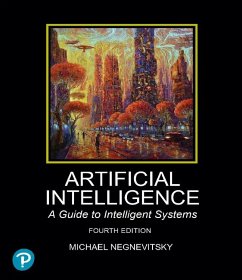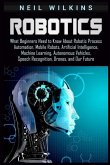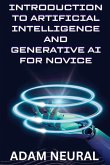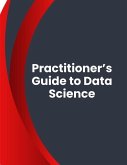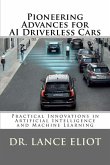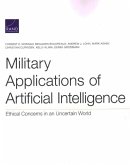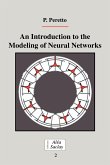Michael Negnevitsky
Artificial Intelligence: A Guide to Intelligent Systems
Michael Negnevitsky
Artificial Intelligence: A Guide to Intelligent Systems
- Broschiertes Buch
- Merkliste
- Auf die Merkliste
- Bewerten Bewerten
- Teilen
- Produkt teilen
- Produkterinnerung
- Produkterinnerung
What are the principles behind intelligent systems? How are they built? What are intelligent systems useful for? How do we choose the right tool for the job? These questions are answered by Michael Negnevitskys Artificial Intelligence: A Guide to Intelligent Systems. Unlike many books on computer intelligence, which use complex computer science terminology and are crowded with complex matrix algebra and differential equations, this text demonstrates that the ideas behind intelligent systems are simple and straightforward. This text assumes little or no programming experience as it tackles…mehr
Andere Kunden interessierten sich auch für
![The Questioning of Intelligence: A Phenomenological Exploration of What It Means To Be Intelligent The Questioning of Intelligence: A Phenomenological Exploration of What It Means To Be Intelligent]() John ThorntonThe Questioning of Intelligence: A Phenomenological Exploration of What It Means To Be Intelligent24,99 €
John ThorntonThe Questioning of Intelligence: A Phenomenological Exploration of What It Means To Be Intelligent24,99 €![Robotics: What Beginners Need to Know about Robotic Process Automation, Mobile Robots, Artificial Intelligence, Machine Learning Robotics: What Beginners Need to Know about Robotic Process Automation, Mobile Robots, Artificial Intelligence, Machine Learning]() Neil WilkinsRobotics: What Beginners Need to Know about Robotic Process Automation, Mobile Robots, Artificial Intelligence, Machine Learning16,99 €
Neil WilkinsRobotics: What Beginners Need to Know about Robotic Process Automation, Mobile Robots, Artificial Intelligence, Machine Learning16,99 €![Introduction to Artificial Intelligence and Generative AI for Novice Introduction to Artificial Intelligence and Generative AI for Novice]() Adam NeuralIntroduction to Artificial Intelligence and Generative AI for Novice16,99 €
Adam NeuralIntroduction to Artificial Intelligence and Generative AI for Novice16,99 €![Practitioner's Guide to Data Science Practitioner's Guide to Data Science]() Crazy SciencePractitioner's Guide to Data Science107,99 €
Crazy SciencePractitioner's Guide to Data Science107,99 €![Pioneering Advances for AI Driverless Cars: Practical Innovations in Artificial Intelligence and Machine Learning Pioneering Advances for AI Driverless Cars: Practical Innovations in Artificial Intelligence and Machine Learning]() Lance EliotPioneering Advances for AI Driverless Cars: Practical Innovations in Artificial Intelligence and Machine Learning32,99 €
Lance EliotPioneering Advances for AI Driverless Cars: Practical Innovations in Artificial Intelligence and Machine Learning32,99 €![Military Applications of Artificial Intelligence Military Applications of Artificial Intelligence]() Forrest E MorganMilitary Applications of Artificial Intelligence59,99 €
Forrest E MorganMilitary Applications of Artificial Intelligence59,99 €![An Introduction to the Modeling of Neural Networks An Introduction to the Modeling of Neural Networks]() Pierre PerettoAn Introduction to the Modeling of Neural Networks110,99 €
Pierre PerettoAn Introduction to the Modeling of Neural Networks110,99 €-
-
-
What are the principles behind intelligent systems? How are they built? What are intelligent systems useful for? How do we choose the right tool for the job? These questions are answered by Michael Negnevitskys Artificial Intelligence: A Guide to Intelligent Systems. Unlike many books on computer intelligence, which use complex computer science terminology and are crowded with complex matrix algebra and differential equations, this text demonstrates that the ideas behind intelligent systems are simple and straightforward. This text assumes little or no programming experience as it tackles topics like expert systems, fuzzy systems, artificial neural networks, evolutionary computation, knowledge engineering, and data mining.
Hinweis: Dieser Artikel kann nur an eine deutsche Lieferadresse ausgeliefert werden.
Hinweis: Dieser Artikel kann nur an eine deutsche Lieferadresse ausgeliefert werden.
Produktdetails
- Produktdetails
- Verlag: Pearson Education Limited
- 4. Auflage
- Seitenzahl: 600
- Erscheinungstermin: 24. September 2024
- Englisch
- Abmessung: 159mm x 235mm x 24mm
- Gewicht: 784g
- ISBN-13: 9781292730851
- ISBN-10: 1292730854
- Artikelnr.: 71811958
- Herstellerkennzeichnung
- Produktsicherheitsverantwortliche/r
- Europaallee 1
- 36244 Bad Hersfeld
- gpsr@libri.de
- Verlag: Pearson Education Limited
- 4. Auflage
- Seitenzahl: 600
- Erscheinungstermin: 24. September 2024
- Englisch
- Abmessung: 159mm x 235mm x 24mm
- Gewicht: 784g
- ISBN-13: 9781292730851
- ISBN-10: 1292730854
- Artikelnr.: 71811958
- Herstellerkennzeichnung
- Produktsicherheitsverantwortliche/r
- Europaallee 1
- 36244 Bad Hersfeld
- gpsr@libri.de
1. Introduction to Intelligent Systems
o 1.1 Intelligent Machines, or What Machines Can Do
o 1.2 The History of Artificial Intelligence, or From the Dark
Ages to Knowledge-based Systems
o 1.3 Generative AI
o 1.4 Summary
o Questions for Review
o References
2. Expert Systems
o 2.1 Introduction, or Knowledge Representation Using Rules
o 2.2 The Main Players in the Expert System Development Team
o 2.3 Structure of a Rule-based Expert System
o 2.4 Fundamental characteristics of an expert system
o 2.5 Forward Chaining and Backward Chaining Inference Techniques
o 2.6 MEDIA ADVISOR: A Demonstration Rule-based Expert System
o 2.7 Conflict Resolution
o 2.8 Uncertainty Management in Rule-based Expert Systems
o 2.9 Advantages and Disadvantages of Rule-based Expert systems
o 2.10 Summary
o Questions for Review
o References
3. Fuzzy Systems
o 3.1 Introduction, or What Is Fuzzy Thinking?
o 3.2 Fuzzy Sets
o 3.3 Linguistic Variables and Hedges
o 3.4 Operations of Fuzzy Sets
o 3.6 Fuzzy Inference
o 3.7 Building a Fuzzy Expert System
o 3.8 Summary
o Questions for Review
o References
4. Frame-based Systems and Semantic Networks
o 4.1 Introduction, or What Is a Frame?
o 4.2 Frames as a Knowledge Representation Technique
o 4.3 Inheritance in Frame-based Systems
o 4.4 Methods and Demons
o 4.5 Interaction of Frames and Rules
o 4.6 Buy Smart: A Frame-based Expert System
o 4.7 The Web of Data
o 4.8 RDF Resource Description Framework and RDF Triples
o 4.9 Turtle, RDF Schema and OWL
o 4.10 Querying the Semantic Web with SPARQL
o 4.11 Summary
o Questions for Review
o References
5. Artificial Neural Networks
o 5.1 Introduction, or How the Brain Works
o 5.2 The Neuron as a Simple Computing Element
o 5.3 The Perceptron
o 5.4 Multilayer Neural Networks
o 5.5 Accelerated Learning in Multilayer Neural Networks
o 5.6 The Hopfield Network
o 5.7 Bidirectional Associative Memory
o 5.8 Self-organising Neural Networks
o 5.9 Reinforcement Learning
o 5.10 Summary
o Questions for Review
o References
6. Deep Learning and Convolutional Neural Networks
o 6.1 Introduction, or How Deep Is a Deep Neural Network?
o 6.2 Image Recognition or How Machines See the World
o 6.3 Convolution in Machine Learning
o 6.4 Activation Functions in Deep Neural Networks
o 6.5 Convolutional Neural Networks
o 6.6 Back-propagation Learning in Convolutional Networks
o 6.7 Batch Normalisation
o 6.8 Summary
o Questions for Review
o References
7. Evolutionary Computation
o 7.1 Introduction, or Can Evolution Be Intelligent?
o 7.2 Simulation of Natural Evolution
o 7.3 Genetic Algorithms
o 7.4 Why Genetic Algorithms Work
o 7.5 Maintenance Scheduling with Genetic Algorithms
o 7.6 Genetic Programming
o 7.7 Evolution Strategies
o 7.8 Ant Colony Optimisation
o 7.9 Particle Swarm Optimisation
o 7.10 Summary
o Questions for Review
o References
8. Hybrid Intelligent Systems
o 8.1 Introduction, or How to Combine German Mechanics with
Italian Love
o 8.2 Neural Expert Systems
o 8.3 Neuro-Fuzzy Systems
o 8.4 ANFIS: Adaptive Neuro-Fuzzy Inference System
o 8.5 Evolutionary Neural Networks
o 8.6 Fuzzy Evolutionary Systems
o 8.7 Summary
o Questions for Review
o References
9. Knowledge Engineering
o 9.1 Introduction, or What Is Knowledge Engineering?
o 9.2 Will an Expert System Work for My Problem?
o 9.3 Will a Fuzzy Expert System Work for My Problem?
o 9.4 Will a Neural Network Work for My Problem?
o 9.5 Will a Deep Neural Network Work for My Problem?
o 9.6 Will Genetic Algorithms Work for My Problem?
o 9.7 Will Particle Swarm Optimisation Work for My Problem?
o 9.8 Will a Hybrid Intelligent System Work for My Problem?
o 9.9 Summary
o Questions for Review
o References
10. Data Mining and Knowledge Discovery
o 10.1 Introduction, or What Is Data Mining?
o 10.2 Statistical Methods and Data Visualisation
o 10.3 Principal Components Analysis
o 10.4 Relational Databases and Database Queries
o 10.5 The Data Warehouse and Multidimensional Data Analysis
o 10.6 Decision Trees
o 10.7 Association Rules and Market Basket Analysis
o 10.8 Summary
o Questions for Review
o References
* Glossary
* Index
o 1.1 Intelligent Machines, or What Machines Can Do
o 1.2 The History of Artificial Intelligence, or From the Dark
Ages to Knowledge-based Systems
o 1.3 Generative AI
o 1.4 Summary
o Questions for Review
o References
2. Expert Systems
o 2.1 Introduction, or Knowledge Representation Using Rules
o 2.2 The Main Players in the Expert System Development Team
o 2.3 Structure of a Rule-based Expert System
o 2.4 Fundamental characteristics of an expert system
o 2.5 Forward Chaining and Backward Chaining Inference Techniques
o 2.6 MEDIA ADVISOR: A Demonstration Rule-based Expert System
o 2.7 Conflict Resolution
o 2.8 Uncertainty Management in Rule-based Expert Systems
o 2.9 Advantages and Disadvantages of Rule-based Expert systems
o 2.10 Summary
o Questions for Review
o References
3. Fuzzy Systems
o 3.1 Introduction, or What Is Fuzzy Thinking?
o 3.2 Fuzzy Sets
o 3.3 Linguistic Variables and Hedges
o 3.4 Operations of Fuzzy Sets
o 3.6 Fuzzy Inference
o 3.7 Building a Fuzzy Expert System
o 3.8 Summary
o Questions for Review
o References
4. Frame-based Systems and Semantic Networks
o 4.1 Introduction, or What Is a Frame?
o 4.2 Frames as a Knowledge Representation Technique
o 4.3 Inheritance in Frame-based Systems
o 4.4 Methods and Demons
o 4.5 Interaction of Frames and Rules
o 4.6 Buy Smart: A Frame-based Expert System
o 4.7 The Web of Data
o 4.8 RDF Resource Description Framework and RDF Triples
o 4.9 Turtle, RDF Schema and OWL
o 4.10 Querying the Semantic Web with SPARQL
o 4.11 Summary
o Questions for Review
o References
5. Artificial Neural Networks
o 5.1 Introduction, or How the Brain Works
o 5.2 The Neuron as a Simple Computing Element
o 5.3 The Perceptron
o 5.4 Multilayer Neural Networks
o 5.5 Accelerated Learning in Multilayer Neural Networks
o 5.6 The Hopfield Network
o 5.7 Bidirectional Associative Memory
o 5.8 Self-organising Neural Networks
o 5.9 Reinforcement Learning
o 5.10 Summary
o Questions for Review
o References
6. Deep Learning and Convolutional Neural Networks
o 6.1 Introduction, or How Deep Is a Deep Neural Network?
o 6.2 Image Recognition or How Machines See the World
o 6.3 Convolution in Machine Learning
o 6.4 Activation Functions in Deep Neural Networks
o 6.5 Convolutional Neural Networks
o 6.6 Back-propagation Learning in Convolutional Networks
o 6.7 Batch Normalisation
o 6.8 Summary
o Questions for Review
o References
7. Evolutionary Computation
o 7.1 Introduction, or Can Evolution Be Intelligent?
o 7.2 Simulation of Natural Evolution
o 7.3 Genetic Algorithms
o 7.4 Why Genetic Algorithms Work
o 7.5 Maintenance Scheduling with Genetic Algorithms
o 7.6 Genetic Programming
o 7.7 Evolution Strategies
o 7.8 Ant Colony Optimisation
o 7.9 Particle Swarm Optimisation
o 7.10 Summary
o Questions for Review
o References
8. Hybrid Intelligent Systems
o 8.1 Introduction, or How to Combine German Mechanics with
Italian Love
o 8.2 Neural Expert Systems
o 8.3 Neuro-Fuzzy Systems
o 8.4 ANFIS: Adaptive Neuro-Fuzzy Inference System
o 8.5 Evolutionary Neural Networks
o 8.6 Fuzzy Evolutionary Systems
o 8.7 Summary
o Questions for Review
o References
9. Knowledge Engineering
o 9.1 Introduction, or What Is Knowledge Engineering?
o 9.2 Will an Expert System Work for My Problem?
o 9.3 Will a Fuzzy Expert System Work for My Problem?
o 9.4 Will a Neural Network Work for My Problem?
o 9.5 Will a Deep Neural Network Work for My Problem?
o 9.6 Will Genetic Algorithms Work for My Problem?
o 9.7 Will Particle Swarm Optimisation Work for My Problem?
o 9.8 Will a Hybrid Intelligent System Work for My Problem?
o 9.9 Summary
o Questions for Review
o References
10. Data Mining and Knowledge Discovery
o 10.1 Introduction, or What Is Data Mining?
o 10.2 Statistical Methods and Data Visualisation
o 10.3 Principal Components Analysis
o 10.4 Relational Databases and Database Queries
o 10.5 The Data Warehouse and Multidimensional Data Analysis
o 10.6 Decision Trees
o 10.7 Association Rules and Market Basket Analysis
o 10.8 Summary
o Questions for Review
o References
* Glossary
* Index
1. Introduction to Intelligent Systems
o 1.1 Intelligent Machines, or What Machines Can Do
o 1.2 The History of Artificial Intelligence, or From the Dark
Ages to Knowledge-based Systems
o 1.3 Generative AI
o 1.4 Summary
o Questions for Review
o References
2. Expert Systems
o 2.1 Introduction, or Knowledge Representation Using Rules
o 2.2 The Main Players in the Expert System Development Team
o 2.3 Structure of a Rule-based Expert System
o 2.4 Fundamental characteristics of an expert system
o 2.5 Forward Chaining and Backward Chaining Inference Techniques
o 2.6 MEDIA ADVISOR: A Demonstration Rule-based Expert System
o 2.7 Conflict Resolution
o 2.8 Uncertainty Management in Rule-based Expert Systems
o 2.9 Advantages and Disadvantages of Rule-based Expert systems
o 2.10 Summary
o Questions for Review
o References
3. Fuzzy Systems
o 3.1 Introduction, or What Is Fuzzy Thinking?
o 3.2 Fuzzy Sets
o 3.3 Linguistic Variables and Hedges
o 3.4 Operations of Fuzzy Sets
o 3.6 Fuzzy Inference
o 3.7 Building a Fuzzy Expert System
o 3.8 Summary
o Questions for Review
o References
4. Frame-based Systems and Semantic Networks
o 4.1 Introduction, or What Is a Frame?
o 4.2 Frames as a Knowledge Representation Technique
o 4.3 Inheritance in Frame-based Systems
o 4.4 Methods and Demons
o 4.5 Interaction of Frames and Rules
o 4.6 Buy Smart: A Frame-based Expert System
o 4.7 The Web of Data
o 4.8 RDF Resource Description Framework and RDF Triples
o 4.9 Turtle, RDF Schema and OWL
o 4.10 Querying the Semantic Web with SPARQL
o 4.11 Summary
o Questions for Review
o References
5. Artificial Neural Networks
o 5.1 Introduction, or How the Brain Works
o 5.2 The Neuron as a Simple Computing Element
o 5.3 The Perceptron
o 5.4 Multilayer Neural Networks
o 5.5 Accelerated Learning in Multilayer Neural Networks
o 5.6 The Hopfield Network
o 5.7 Bidirectional Associative Memory
o 5.8 Self-organising Neural Networks
o 5.9 Reinforcement Learning
o 5.10 Summary
o Questions for Review
o References
6. Deep Learning and Convolutional Neural Networks
o 6.1 Introduction, or How Deep Is a Deep Neural Network?
o 6.2 Image Recognition or How Machines See the World
o 6.3 Convolution in Machine Learning
o 6.4 Activation Functions in Deep Neural Networks
o 6.5 Convolutional Neural Networks
o 6.6 Back-propagation Learning in Convolutional Networks
o 6.7 Batch Normalisation
o 6.8 Summary
o Questions for Review
o References
7. Evolutionary Computation
o 7.1 Introduction, or Can Evolution Be Intelligent?
o 7.2 Simulation of Natural Evolution
o 7.3 Genetic Algorithms
o 7.4 Why Genetic Algorithms Work
o 7.5 Maintenance Scheduling with Genetic Algorithms
o 7.6 Genetic Programming
o 7.7 Evolution Strategies
o 7.8 Ant Colony Optimisation
o 7.9 Particle Swarm Optimisation
o 7.10 Summary
o Questions for Review
o References
8. Hybrid Intelligent Systems
o 8.1 Introduction, or How to Combine German Mechanics with
Italian Love
o 8.2 Neural Expert Systems
o 8.3 Neuro-Fuzzy Systems
o 8.4 ANFIS: Adaptive Neuro-Fuzzy Inference System
o 8.5 Evolutionary Neural Networks
o 8.6 Fuzzy Evolutionary Systems
o 8.7 Summary
o Questions for Review
o References
9. Knowledge Engineering
o 9.1 Introduction, or What Is Knowledge Engineering?
o 9.2 Will an Expert System Work for My Problem?
o 9.3 Will a Fuzzy Expert System Work for My Problem?
o 9.4 Will a Neural Network Work for My Problem?
o 9.5 Will a Deep Neural Network Work for My Problem?
o 9.6 Will Genetic Algorithms Work for My Problem?
o 9.7 Will Particle Swarm Optimisation Work for My Problem?
o 9.8 Will a Hybrid Intelligent System Work for My Problem?
o 9.9 Summary
o Questions for Review
o References
10. Data Mining and Knowledge Discovery
o 10.1 Introduction, or What Is Data Mining?
o 10.2 Statistical Methods and Data Visualisation
o 10.3 Principal Components Analysis
o 10.4 Relational Databases and Database Queries
o 10.5 The Data Warehouse and Multidimensional Data Analysis
o 10.6 Decision Trees
o 10.7 Association Rules and Market Basket Analysis
o 10.8 Summary
o Questions for Review
o References
* Glossary
* Index
o 1.1 Intelligent Machines, or What Machines Can Do
o 1.2 The History of Artificial Intelligence, or From the Dark
Ages to Knowledge-based Systems
o 1.3 Generative AI
o 1.4 Summary
o Questions for Review
o References
2. Expert Systems
o 2.1 Introduction, or Knowledge Representation Using Rules
o 2.2 The Main Players in the Expert System Development Team
o 2.3 Structure of a Rule-based Expert System
o 2.4 Fundamental characteristics of an expert system
o 2.5 Forward Chaining and Backward Chaining Inference Techniques
o 2.6 MEDIA ADVISOR: A Demonstration Rule-based Expert System
o 2.7 Conflict Resolution
o 2.8 Uncertainty Management in Rule-based Expert Systems
o 2.9 Advantages and Disadvantages of Rule-based Expert systems
o 2.10 Summary
o Questions for Review
o References
3. Fuzzy Systems
o 3.1 Introduction, or What Is Fuzzy Thinking?
o 3.2 Fuzzy Sets
o 3.3 Linguistic Variables and Hedges
o 3.4 Operations of Fuzzy Sets
o 3.6 Fuzzy Inference
o 3.7 Building a Fuzzy Expert System
o 3.8 Summary
o Questions for Review
o References
4. Frame-based Systems and Semantic Networks
o 4.1 Introduction, or What Is a Frame?
o 4.2 Frames as a Knowledge Representation Technique
o 4.3 Inheritance in Frame-based Systems
o 4.4 Methods and Demons
o 4.5 Interaction of Frames and Rules
o 4.6 Buy Smart: A Frame-based Expert System
o 4.7 The Web of Data
o 4.8 RDF Resource Description Framework and RDF Triples
o 4.9 Turtle, RDF Schema and OWL
o 4.10 Querying the Semantic Web with SPARQL
o 4.11 Summary
o Questions for Review
o References
5. Artificial Neural Networks
o 5.1 Introduction, or How the Brain Works
o 5.2 The Neuron as a Simple Computing Element
o 5.3 The Perceptron
o 5.4 Multilayer Neural Networks
o 5.5 Accelerated Learning in Multilayer Neural Networks
o 5.6 The Hopfield Network
o 5.7 Bidirectional Associative Memory
o 5.8 Self-organising Neural Networks
o 5.9 Reinforcement Learning
o 5.10 Summary
o Questions for Review
o References
6. Deep Learning and Convolutional Neural Networks
o 6.1 Introduction, or How Deep Is a Deep Neural Network?
o 6.2 Image Recognition or How Machines See the World
o 6.3 Convolution in Machine Learning
o 6.4 Activation Functions in Deep Neural Networks
o 6.5 Convolutional Neural Networks
o 6.6 Back-propagation Learning in Convolutional Networks
o 6.7 Batch Normalisation
o 6.8 Summary
o Questions for Review
o References
7. Evolutionary Computation
o 7.1 Introduction, or Can Evolution Be Intelligent?
o 7.2 Simulation of Natural Evolution
o 7.3 Genetic Algorithms
o 7.4 Why Genetic Algorithms Work
o 7.5 Maintenance Scheduling with Genetic Algorithms
o 7.6 Genetic Programming
o 7.7 Evolution Strategies
o 7.8 Ant Colony Optimisation
o 7.9 Particle Swarm Optimisation
o 7.10 Summary
o Questions for Review
o References
8. Hybrid Intelligent Systems
o 8.1 Introduction, or How to Combine German Mechanics with
Italian Love
o 8.2 Neural Expert Systems
o 8.3 Neuro-Fuzzy Systems
o 8.4 ANFIS: Adaptive Neuro-Fuzzy Inference System
o 8.5 Evolutionary Neural Networks
o 8.6 Fuzzy Evolutionary Systems
o 8.7 Summary
o Questions for Review
o References
9. Knowledge Engineering
o 9.1 Introduction, or What Is Knowledge Engineering?
o 9.2 Will an Expert System Work for My Problem?
o 9.3 Will a Fuzzy Expert System Work for My Problem?
o 9.4 Will a Neural Network Work for My Problem?
o 9.5 Will a Deep Neural Network Work for My Problem?
o 9.6 Will Genetic Algorithms Work for My Problem?
o 9.7 Will Particle Swarm Optimisation Work for My Problem?
o 9.8 Will a Hybrid Intelligent System Work for My Problem?
o 9.9 Summary
o Questions for Review
o References
10. Data Mining and Knowledge Discovery
o 10.1 Introduction, or What Is Data Mining?
o 10.2 Statistical Methods and Data Visualisation
o 10.3 Principal Components Analysis
o 10.4 Relational Databases and Database Queries
o 10.5 The Data Warehouse and Multidimensional Data Analysis
o 10.6 Decision Trees
o 10.7 Association Rules and Market Basket Analysis
o 10.8 Summary
o Questions for Review
o References
* Glossary
* Index

